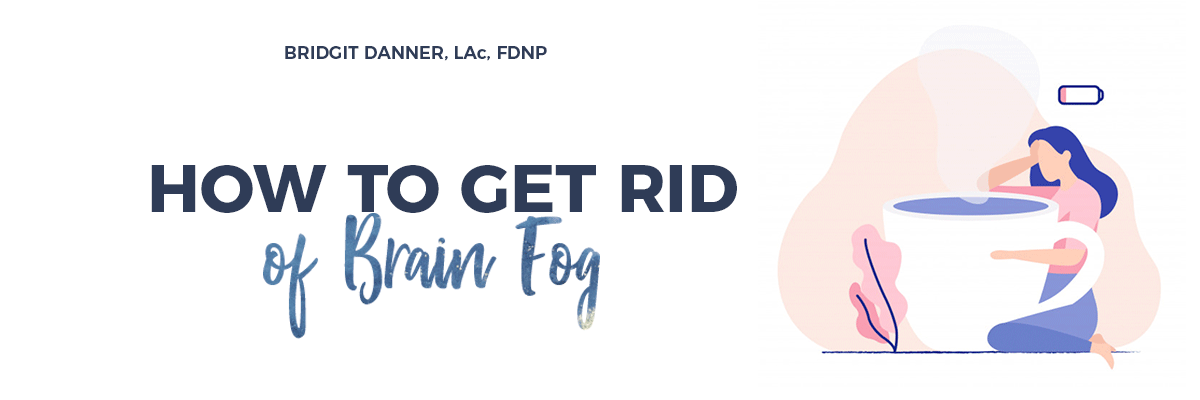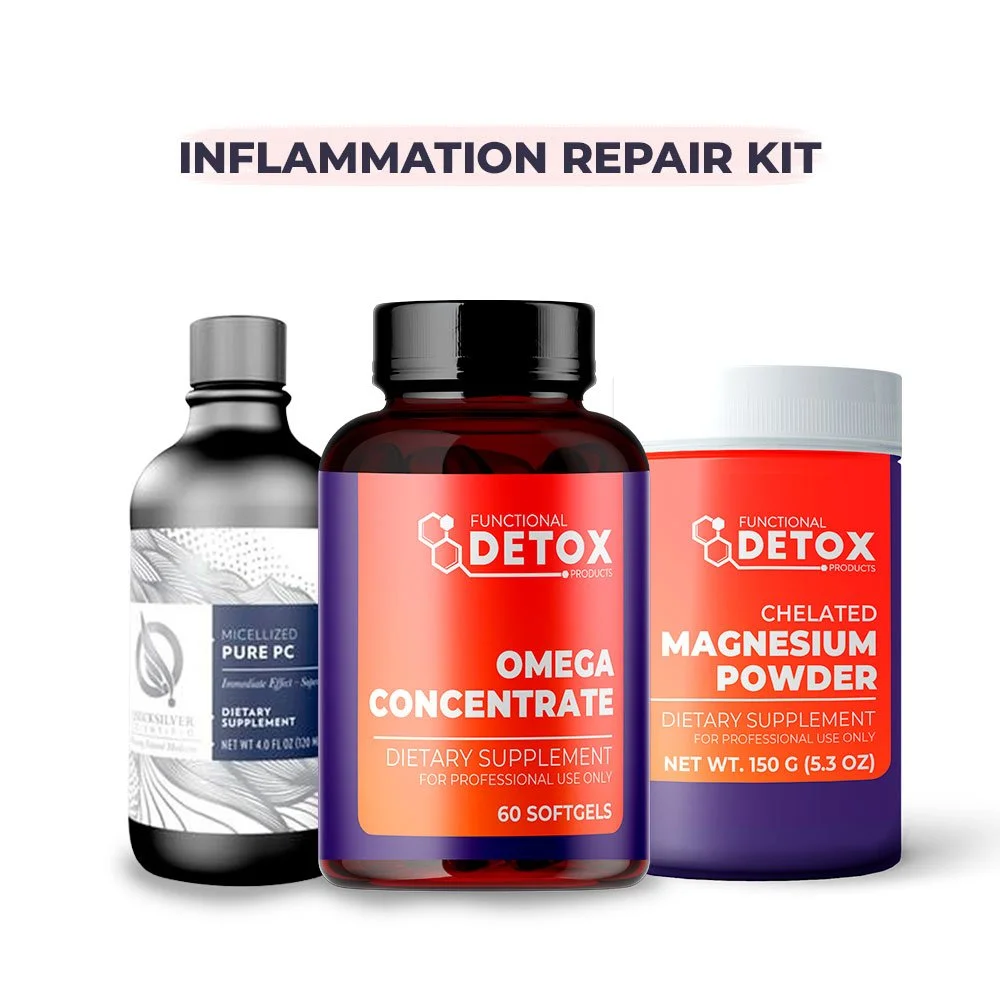The term ‘brain fog’ gets tossed around a lot, and most people can relate to feeling dazed, not thinking clearly, and not being fully able to recall ideas and words. But what is brain fog really, and what are brain fog causes and brain fog cures?
This article will explore the medical explanation for brain fog, which is essentially brain inflammation. We’ll also cover how to get rid of brain fog so that you can be fully present in your life again, free from that annoying cloud!
For a comprehensive explanation of brain inflammation, please watch the video above.
Head in the Clouds: Brain Fog Causes
The brain can become inflamed from acute, chronic or past exposure to inflammatory agents and neurotoxins. It can also be due to physical injury.
A great example of acute neuroinflammation is a hangover. Alcohol is a neurotoxin, and the way you feel the next day is due to neuroinflammation! You likely feel cloudy, are moving slowly and incapable of complex thoughts.
Another example you may have experienced is a fall or a blow to the head. Whether it was while sledding, in a car wreck or during kickboxing class, you may have been left seeing stars, and possibly lost consciousness for a bit. This kind of head injury, that causes our soft brain to rattle inside our hard skull, can lead to inflammation. (1)
When inflammation occurs in the brain after an accident, that is a response to heal the impact. In the best-case scenario, that swelling is acute and the inability to think clearly is temporary. But in other scenarios, that inflammation persists or re-triggers, as we’ll learn about in section two.
Other things that can inflame the brain are:
Toxic mold exposure (2)
Inflammatory foods like wheat and dairy (3)
Stroke or silent stroke
Hypertension
Aging
Emotional trauma (6)
Neurological autoimmune disorder
Drug and alcohol abuse (7)
Brain Inflammation and Glial Priming
Attacks on the cells of the brain can not only cause permanent damage, but also kill these cells, and they don’t come back. So the best thing we can do is avoid any habits we’re doing that can damage the brain, and instead participate in brain fog treatment.
The brain is made of about 10% neurons, and the rest of the cells are glial cells. While many things can inflame the brain, a more dangerous occurrence is when these glial cells become ‘primed.’
These glial cells are the important helpers of the brain. They eat up damaged proteins, they connect neurons, they help you recollect things, etc. We want these glial cells in a ‘steady state', meaning they are ready to respond to anything. This is what keeps you responsive and alert to life!
When there are certain insults to the brain, these glial cells become damaged and ‘primed.’ That means instead of a steady-state, ready for anything, they are overactive. Primed glial cells will react to peripheral immune stimulation like autoimmune flare-ups, stress or another head injury.
Head injuries and infections that cross the blood-brain barrier can cause glial priming. Simply eating inflammatory foods, like wine and bread, will not. However, continually eating inflammatory foods, while stressed, can break down the gut barrier and lead to a breakdown of the blood-brain barrier, which does leave you vulnerable to potential glial priming, especially when occurring with other cofactor. (3, 8)
Brain Fog Symptoms
Brain inflammation symptoms include:
Constipation
Chronic digestive problems
Food sensitivities
Chemical sensitivities
Needing to eat often
Waking in the night
Needing extra sleep
Fatigue, especially after mental work
Discoordination
Poor appetite
Difficulty learning new things
Difficulty remembering things
Depression or mood swings
Sensitivity to EMF
How to Get Rid of Brain Fog
Dr. Datis Kharrazian is an expert in the field of reversing neuroinflammation. He emphasizes that lifestyle interventions are most important for brain health.
Start by getting a good night’s sleep.
If you are staying up late watching TV, reel it in! Get off blue light screens at least one hour prior to bedtime. Spend some time unwinding, reading, taking a walk, taking a bath, etc. Turn the lights down around your home. Try to be in bed by 10 PM.
If you are waking during the night, this often indicates a blood sugar issue. As an inflamed brain uses extra glucose, your body is tapping its stores of fuel during the night.
You may need to eat more often during the day for now. Focus on nutrient-dense whole foods like avocado, wild and free-range meats, raw nuts, and vegetables. Avoid processed flours, sugars, caffeine and alcohol that will upset your blood sugar.
Don’t forget to move.
When you are tired and symptomatic, you may not feel like exercising. But exercise sends oxygen to the brain and actually repairs the damage.
This does not mean to do Crossfit if it’s too much for you! If you can’t recover well from your work-out, it’s too much. But do challenge yourself to try new forms of exercise. Burst training, short bursts of intense exercise, are especially helpful for the brain. This could be jumping rope or using a mini-trampoline a few times a day.
Any type of exercise is helpful so start where you are now. But do try to keep increasing the variety and intensity of your exercise.
Try a ketogenic diet or fasting.
Both ketosis and fasting have documented benefits for the brain. If you feel you’ve ‘tried everything,’ this may be a new area to explore.
As you improve your diet and move into a paleo-type whole foods diet, you may want to try a fat-first ketogenic diet. There are lots of resources on it out there, including the website and cookbooks by my friend Maria Emmerich.
Once you move to a fueling system that burns ketones primarily, you are ready to experiment with fasting. For this one, I’d suggest checking the resources of another colleague of mine, Dr. David Jockers.
Consider hyperbaric oxygen.
This is a treatment that I've recently tried and I am thinking of investing in a home unit. This treatment is not as exotic as I once thought! It simply pressures the air around you so that more oxygen is forced into your cells.
Many veterans experience brain inflammation both due to injury and psychological trauma. Studies are being done on the possible benefits of hyperbaric oxygen in this population:
“Pooled (Department of Defense) data analyses indicated trends toward improvement favoring HBO2 (hyperbaric oxygen) for PCS (post-concussive symptoms) and PTSD (post-traumatic stress disorder) and significant improvement in verbal memory.” (9, 10, 11, 12)
Take anti-inflammatory supplements.
There are several supplements that are proven in studies to de-flame the brain. I’ll focus on a few of the top choices here.
Omega 3
This simple supplement contains DHA (Docosahexaenoic acid) that is needed for brain health. In fact, if you don’t have enough, the body may break down neurons to harvest DHA from them! DHA is anti-inflammatory for the brain, and EPA, another component in Omega 3 (found in fish oil), is anti-inflammatory for the gut.
Quality matters with Omega 3! Low-quality Omega 3 can contain heavy metals, be rancid or be impure. I use soft gel capsules from a trusted brand to get a high dose. Always store in a cool, dark place and don’t let it sit open too long.
Omega 3 also benefits your hormones and detoxification. Read more about it on our blog, How Healthy Fats Benefit Hormones and Detoxification. Purchase our preferred brand of Omega 3 here.
Magnesium
Without adequate magnesium, the 300 biochemical processes in the body that rely on this nutrient cannot function properly.
Finally, glutathione, the body's most potent natural detoxifier, relies on magnesium for its synthesis. (13)
We carry a very well-absorbed magnesium that is bound to an amino acid so that your body recognizes it as food and it can be digested. It is in a powdered form and I usually take 1 scoop per day but I may take two per day if I am flared up with inflammation. Learn more here.
Phosphatidylcholine (PC)
Phosphatidylcholine is a crucial molecule that serves as a structural component of cell membranes. It is my secret weapon for brain fog. Without enough phosphatidylcholine, cells quickly succumb to the damaging effects of oxidative stress, causing dysfunction in the brain.
In addition, the choline in PC is important for neurocognitive health. It is a building block for a neurotransmitter associated with attention and alertness—acetylcholine. We wrote a whole article about it: The Brain-Boosting Benefits of Phosphatidylcholine.
You can purchase a very pure, fast-acting form of it here.
The above three products are my absolute favorites for inflammation. As someone who got very sick from toxic mold, I can tell you that they work! We have them packaged as a bundle for 10% off in our shop here.
More Resources
For more information about how to get rid of brain fog, please see the video at the start of this blog and download my free guide to the right.
Taking charge of your health starts with education, and then action!
Print out this guide and ensure you remember some of the tips in this article and start putting them into practice.
The guide includes a coupon code for your first order at our shop.
When did your brain fog start? What has helped you so far?
Bridgit Danner, LAc, FDNP, is an acupuncturist turned functional health coaching and has worked with thousands of clients since 2004.
She is the founder of FunctionalDetoxProducts.com and the author of The Ultimate Guide to Toxic Mold Recovery: Take Back Your Home Health & Life, available in audiobook, Kindle and paperback on Amazon.




